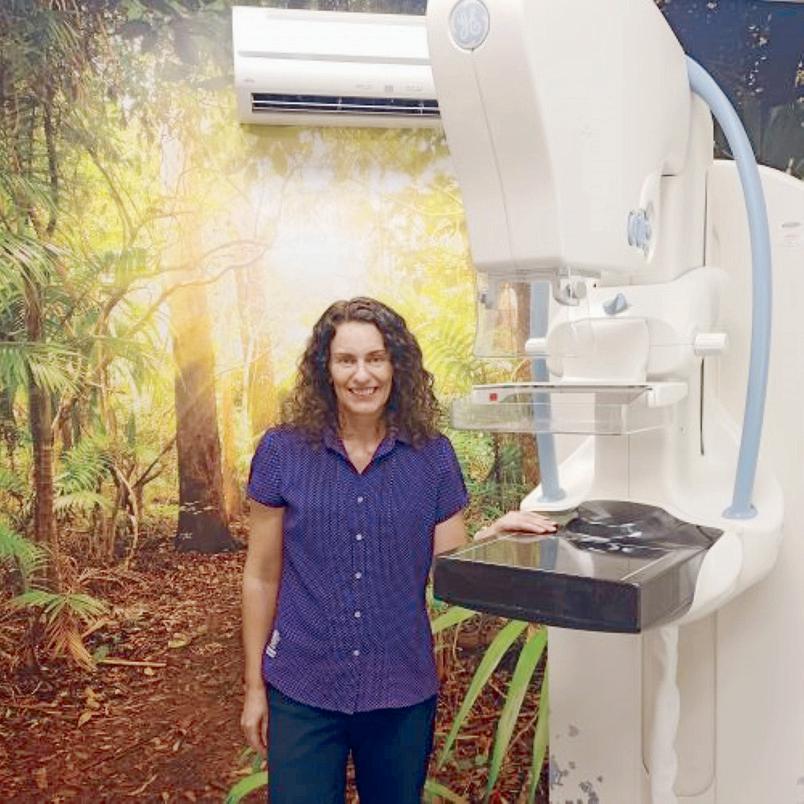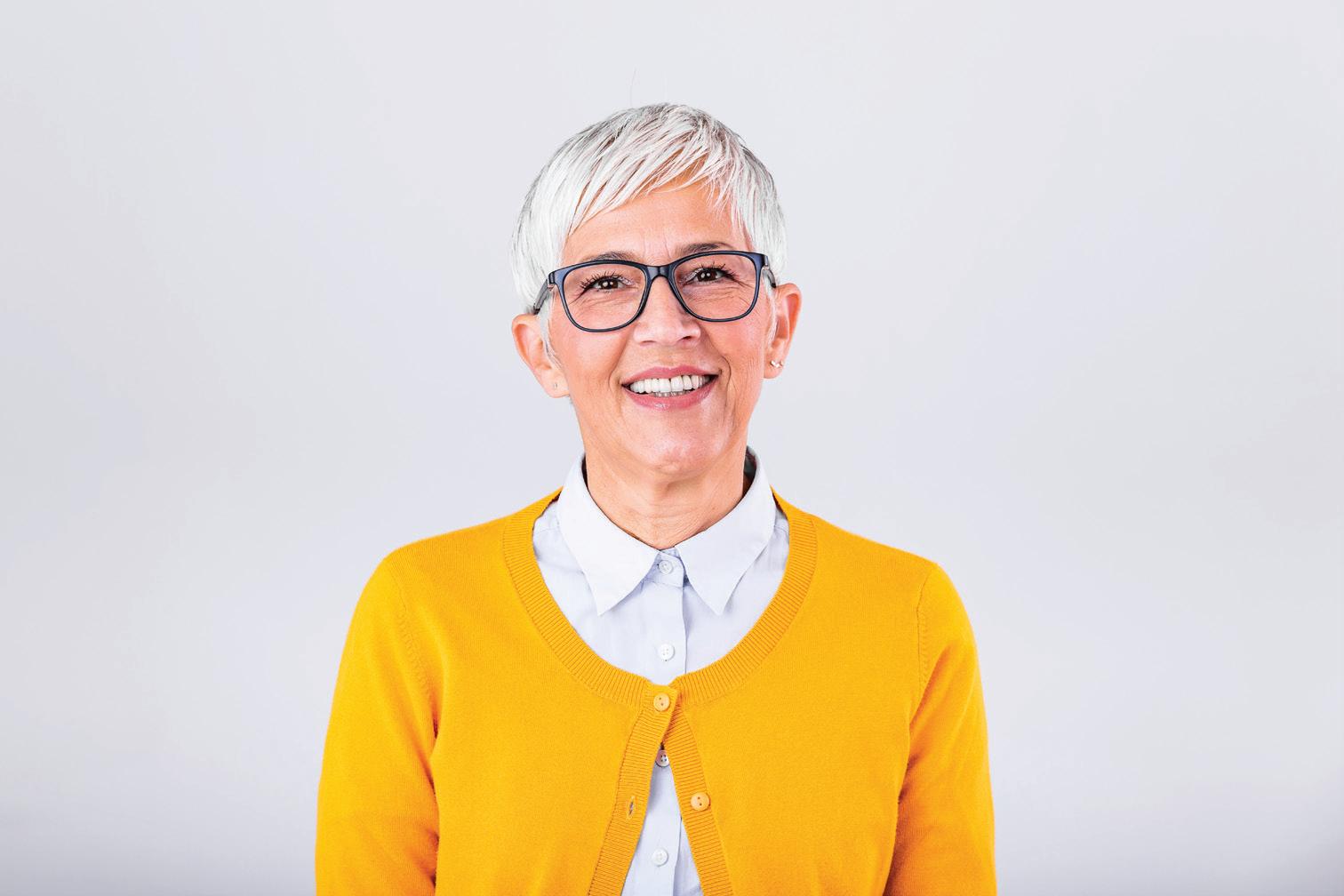
9 minute read
HEALTH .......................pages
New protective armour for falls and sporting support
The death of her grandmother has inspired Brisbane woman Stephanie Bofinger to launch a new product aimed at protecting women during sport and those over 65 from major injuries caused by falls.
Stephanie Bofinger was inspired to create Fempro Armour – a lightweight, wearable “armour” to protect women and older men, after her family tragedy.
“I was heartbroken when my grandmother died from other complications while having surgery for a broken hip which could have been prevented,” Stephanie said.
“Ageing – and particularly things such as dementia and Parkinson’s – affects elderly people’s stability and their risk of falling is far greater.
“Whether they are falling from a chair or a motorbike, the impact is the same.
“And just because they are old doesn’t mean they have to wear something ugly to protect themselves - what’s on the market now is bulky and heavy.”
She said the Armour could also be used by women across a range of sports – from motorsports, cycling and equestrian to rugby league, netball, basketball, hockey, skating and skiing, or martial arts – and professional fields such as law enforcement, or working with large animals.
The garments are made from soft, breathable bamboo fabrics and recycled bottles and fishnets, and all protective armour is European Certified (CE level 1 and 2), and can be worn comfortably under everyday clothing.
The Fempro Armour range grew from Stephanie’s research into protective gear designed specifically to fit women involved in impact sports – after she struggled to find motorcycle sports protection that fit her properly.
Using a revolutionary memory foam technology, the armour can protect the chest, hip, elbow, shoulder and back and is lightweight and flexible.
The viscoelastic memory foam is lightweight but still incredibly impact absorbent – and softens further, becoming even more comfortable, with body heat.
However, with the death of her grandmother she realised that they would also be useful for those who weren’t as mobile.
She said each year one third of people aged 65 or older will experience a fall – with many resulting in serious injury or even death.
Falls account for 42% of all hospital injury cases in Australia. Of those, more than half (58%) were people aged 65 or older – while 95% of all deaths from accidental falls were among the elderly, the majority of them women.
The range of singlets, long-sleeve tops and pull-on pants can be worn discreetly under regular clothing, and armour pieces can even be inserted or removed as needed.
“Falls are a major issue, affecting one in three people over the age of 65 and half of people over the age of 80,” Stephanie said.
“And the proportion of people over 65 is forecast to grow from about 3.5 million now to more than 20% of the population at more than 8 million in 2050.
“A lot of elderly people die from their injuries or from complications from their injury. Of those who survive, their health is impacted and only a third retain mobility.”
Armour can also be used by women across a range of sports – from motorsports, cycling and equestrian to rugby league, netball, basketball, hockey, skating and skiing, or martial arts – and professional fields such as law enforcement, or working with large animals.
The garments are made from soft, breathable bamboo fabrics and recycled bottles and fishnets, and all protective armour is European Certified (CE level 1 and 2), and can be worn comfortably under everyday clothing.
About Fempro Armour: Fempro Armour produces high quality European Certified body protection armour and apparel to protect women involved in impact sports or those over 65. It uses a ground-breaking “smart” polymer technology to design armour and apparel to comfortably fit women of all shapes and sizes. More info femproarmour.com
Stephanie Bofinger,
Skin spots
Did you know that the Sunshine State is the skin cancer capital of the world? In Queensland, melanoma rates reach 40 per cent higher than the national average.
Every day, five Australians lose their lives to melanoma, which is sometimes barely visible to the naked eye. But 99 per cent of skin cancers are curable if detected and treated early, which is why experts recommend regular skin checks.
“A full skin cancer check is the best place to start to ensure your skin is healthy and safe,” Professor David Wilkinson, Chief Medical Officer of National Skin Cancer Centres said.
“Your Skin Cancer Doctor can provide you with peace of mind that there are no nasty surprises which could lead to serious problems if left undiagnosed and untreated.
“Early detection through regular full-body skin cancer checks is the best defence. Our mission is to detect skin cancers in the early stages to minimise complex, invasive and expensive treatments, and ultimately save lives.”
Between professional skin checks, we can look out for lesions that stand out as different from the others. Check for any sores that won’t heal, freckles that have recently developed or changed, or areas that are crusting, itching, or bleeding.
If anything looks suspicious, get it checked. Skin cancer can develop very fast and become fatal, and sometimes shows no signs until an advanced stage.
Queenslanders can be at particularly high risk of skin cancer if they are over 40, male, or have a personal or family history of skin cancer. The risk is also higher for people who have experienced severe sunburn, used a solarium, worked outdoors, or have multiple moles, fair skin, or light-coloured hair or eyes.
Fortunately, a lifetime of sun exposure can be addressed before it takes a toll on our skin health. Spring is a great time to address existing skin damage and early signs of ageing.
“In addition to a skin cancer check, many of our patients who have seen too much sun over their lives benefit from skin repair and rejuvenation treatments to improve skin health and appearance,” says Prof Wilkinson.
Select locations at the National Skin Cancer Centres provide skin repair and rejuvenation services for comprehensive management of patients’ skin health, including LED light therapy and cosmetic injectable treatments.
“It’s never too late to repair sun damaged skin.
“We see lots of patients with dehydrated or dry skin. Some are experiencing flare-ups of rosacea or acne. At this time of year, many people are thinking about getting their skin summer-ready, so they want to start a treatment regime with long-term benefits.”
To find the nearest location at the National Skin Cancer Centres throughout Queensland, visit skincancercentres.com.au.
Detecting skin abnomalities.

Screens free
One in seven women will be diagnosed with breast cancer by the age of 85. Breast cancer risk increases with age, with about 80 per cent of breast cancers occurring in women over 50.
Breast screening aims to find breast cancers that are very small, when they are easier to treat. Finding breast cancer early can increase treatment options and save lives.
BreastScreen Queensland provides free screening and assessment services to ensure women have the best possible outcome following a breast cancer diagnosis.
Local services are now available in more locations including at Helensvale, Robina, Southport, West Burleigh, and various short-term mobile clinics.
Screening mammograms are most effective for women aged between 50 and 74, who are recommended to attend every two years. Local women are being urged to attend regular breast screening, which offers many benefits.
Around five in every 100 women attending BreastScreen Queensland services will be asked to return for followup tests. Most women attending their breast screen will be advised that there are no signs of breast cancer.
While breast screening offers some peace of mind, it’s important for all women to be breast aware, even if attending regular screens. Breast cancer can develop in between visits and there is a very small chance a breast cancer won’t be found at the time of screening.
There are different benefits and risks of screening depending on a woman’s age and individual circumstances. Women are eligible to attend a free breast screen from age 40.
Women in their forties or 75 or older are encouraged to talk with their doctor to help them decide if breast screening is right for them. More information on screening benefit and risk is available on the BreastScreen Queensland website.
A breast screen appointment can be booked online at breastscreen.qld.gov. au or by phoning 13 20 50.

Marg at Queensland Breastscreen Gold Coast.
Advertisement
Aged 50-74?
Book a free breast screen today, it could save your life. Dementia Australia boost

Dementia Australia has welcomed the Covid-19 vaccination booster program which began in residential aged care homes in mid November.
Dementia Australia CEO Maree McCabe AM said people living with dementia are some of the most vulnerable people in our community who have been at heightened risk of COVID-19 throughout the pandemic.
The impact of vaccinations throughout 2021 has provided some assurance to residents, families and staff in reducing their risk of developing serious symptoms,” Ms McCabe said.
“The vaccination booster now available to all will contribute further protection making the environment safer for all – for the individuals, other residents, staff, family and visitors.”
With more than two-thirds of aged care residents living with moderate to severe cognitive impairment it is essential clear communication, and enough time is provided to enable informed consent.
“The consent process must allow a person living with dementia or cognitive impairment time to digest the information, ask questions and perhaps consult with a family carer,” Ms McCabe said.
“This also allows time for the staff to consult with and obtain consent from a substitute decision maker or guardian if required.
“It is important for all residential aged care providers to ensure the teams administering the vaccinations are suitably supported to determine a resident’s capacity to provide informed consent for the booster program.
“Another crucial element of the process is ensuring staff know what to look for and what to do if a resident who is living with dementia or a cognitive impairment experiences an adverse vaccination reaction.
“People living with dementia or cognitive impairment may not always be able to communicate adverse reactions.”
Dementia Australia supports mandatory vaccinations across the aged care sector and urges people living with dementia or mild cognitive impairment, their families and carers, to receive all the recommended Covid-19 vaccinations as soon as possible.
From Monday 8 November, booster vaccines have been available for all aged care residents and staff who have completed their primary course (two doses) of a Covid-19 vaccination at least six months earlier. Anyone with questions or concerns for themselves or a loved one are welcome to call the National Dementia Helpline 1800 100 500.











